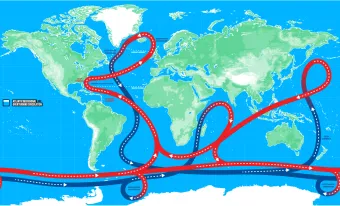
A new study sheds light on the vital role that the mixing of Atlantic and Arctic waters plays in sustaining the Atlantic Meridional Overturning Circulation (AMOC), which is crucial for regulating Earth’s climate.
Researchers from the National Oceanography Centre (NOC), University of Southampton, the Indian Institute of Technology Bhubaneswar and Stockholm University analysed ocean model data from 1979 to 2021 to better understand how the mixing of Atlantic and Arctic waters helps to maintain the AMOC.
The AMOC acts like a giant ocean conveyor belt moving warm water from the tropics north and cold water south, distributing heat around the planet. It helps to keep Northern Europe, including the UK, relatively mild compared to other regions at similar latitudes.
The study published in Nature Communications found that the lower limb of the AMOC – the part of this “conveyor belt” driven by the formation of deep, cold, dense water in the Atlantic Ocean – is composed of 72% Atlantic waters and 28% Arctic waters.
Study co-author Dr Jeremy Grist, based at NOC in Southampton, says, “The study redefines our understanding of the processes responsible for the formation of dense water needed for the overturning.
“Previous studies have strongly emphasised the role of air-sea interaction as the dominant process. We have shown that mixing between the warm and salty Atlantic Ocean water and the cold and fresh Arctic water at the boundary between the Nordic seas and the Atlantic is also responsible for a large part of the dense water formation.”
Dr Dipanjan Dey, lead author of the paper, who undertook the research as a postdoctoral researcher at the University of Southampton, says, “Climate models need to accurately represent these water mixing processes to better predict future climate scenarios.”
Dr Bablu Sinha, co-author, also based at NOC Southampton, says, “The results emphasize that it is important for models to accurately model the balance between surface heat loss compared to interior mixing in order to realistically model the formation of dense waters.
“As the overturning circulation has a major role in moderating the climate of UK and western Europe, it is important to use models which realistically capture these mixing processes to understand how the AMOC will be affected by ongoing climate change.”
Dive under the surface
If you want to learn more, read the full study here.
You can also find out more about the AMOC, what it is, what we know about it and the research we’re doing at NOC.